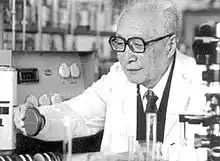| Ri Sung-gi | |
 | |
| Korean name | |
|---|---|
| Chosŏn'gŭl | 리승기 |
| Hancha | 李升基 |
| Revised Romanization | Ri Seunggi |
| McCune–Reischauer | Ri Sŭnggi |
Ri Sung-gi, also often spelled Lee Sung-ki, Lee Seung-gi or Yi Sung-gi (October 1, 1905 – February 8, 1996),[1] was a North Korean chemist. He is best remembered as the inventor of Vinalon. He has also been accused of involvement in North Korea's chemical and nuclear weapons programs.
Ri was born in Damyang, Jeollanam-do, in 1905. He graduated from the local pot'ong hakkyo and received his degree in chemistry from Kyoto University in 1931. He developed Vinalon in 1939. In 1946, after Korean independence from Japanese occupation, he participated in the development of Gyeongseong University, but strongly opposed the university's official conversion to Seoul National University under the American military government. Following the outbreak of the Korean War in 1950, he defected to the North.[1]
Ri received the Lenin Prize in 1962, and was made head of the North Korean Atomic Energy Research Institute in June 1965. He became chief of the Hamhŭng branch of the Academy of Sciences in 1984.[2]
Works
Notes
- 1 2 "이승기". Doopedia (in Korean). Retrieved 2023-06-29.
- ↑ According to Center for Nonproliferation Studies. "Country Overviews: North Korea". Archived from the original on 2007-10-13. Retrieved 2006-09-30., which cites a 1998 work by Lee Chae Sŭng. However, Naver asserts that he held that position from 1961 to 1986.
External links
- Empas entry (in Korean)
- Naver entry (in Korean)